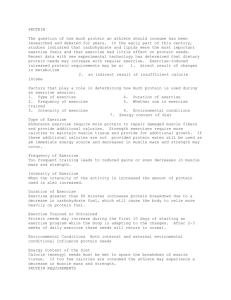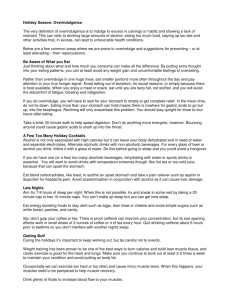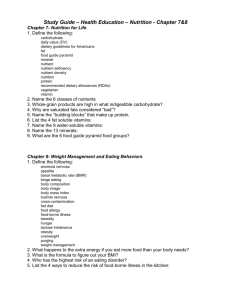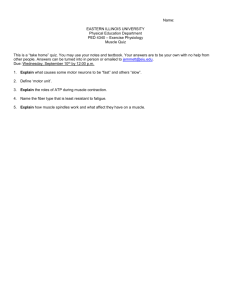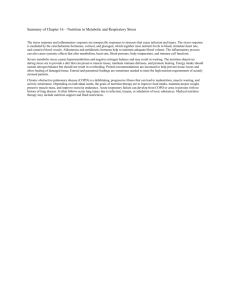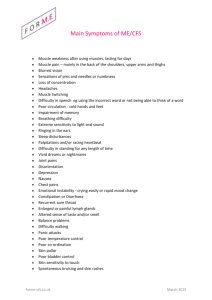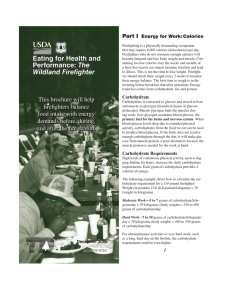Follow a Good Training Program
advertisement
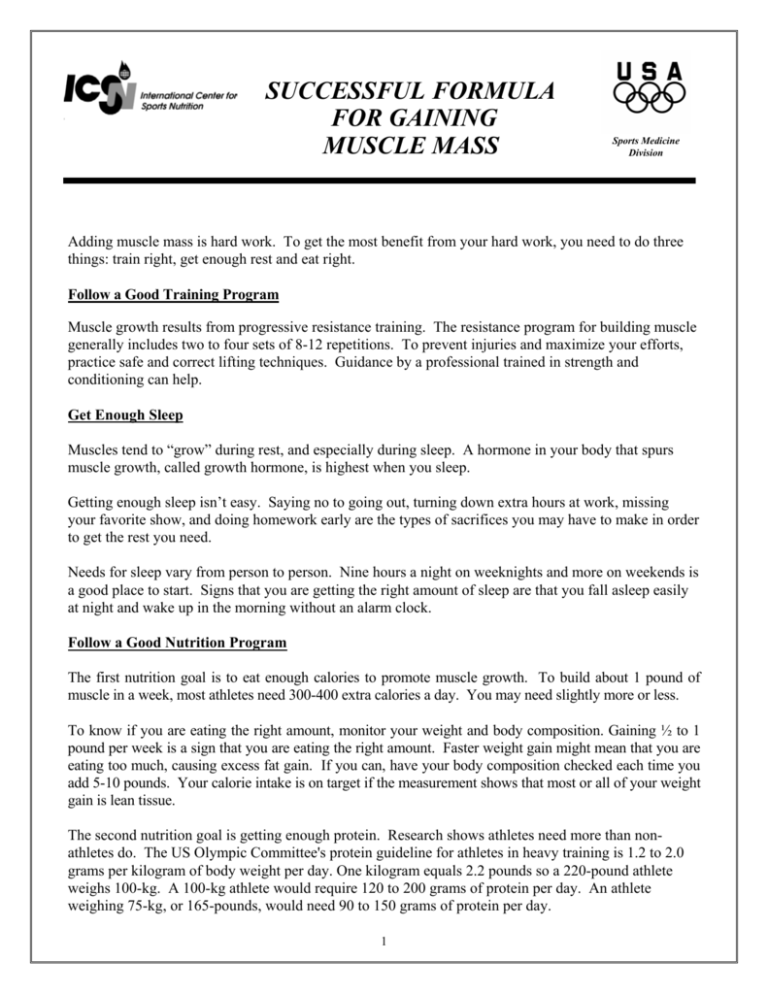
SUCCESSFUL FORMULA FOR GAINING MUSCLE MASS Sports Medicine Division Adding muscle mass is hard work. To get the most benefit from your hard work, you need to do three things: train right, get enough rest and eat right. Follow a Good Training Program Muscle growth results from progressive resistance training. The resistance program for building muscle generally includes two to four sets of 8-12 repetitions. To prevent injuries and maximize your efforts, practice safe and correct lifting techniques. Guidance by a professional trained in strength and conditioning can help. Get Enough Sleep Muscles tend to “grow” during rest, and especially during sleep. A hormone in your body that spurs muscle growth, called growth hormone, is highest when you sleep. Getting enough sleep isn’t easy. Saying no to going out, turning down extra hours at work, missing your favorite show, and doing homework early are the types of sacrifices you may have to make in order to get the rest you need. Needs for sleep vary from person to person. Nine hours a night on weeknights and more on weekends is a good place to start. Signs that you are getting the right amount of sleep are that you fall asleep easily at night and wake up in the morning without an alarm clock. Follow a Good Nutrition Program The first nutrition goal is to eat enough calories to promote muscle growth. To build about 1 pound of muscle in a week, most athletes need 300-400 extra calories a day. You may need slightly more or less. To know if you are eating the right amount, monitor your weight and body composition. Gaining ½ to 1 pound per week is a sign that you are eating the right amount. Faster weight gain might mean that you are eating too much, causing excess fat gain. If you can, have your body composition checked each time you add 5-10 pounds. Your calorie intake is on target if the measurement shows that most or all of your weight gain is lean tissue. The second nutrition goal is getting enough protein. Research shows athletes need more than nonathletes do. The US Olympic Committee's protein guideline for athletes in heavy training is 1.2 to 2.0 grams per kilogram of body weight per day. One kilogram equals 2.2 pounds so a 220-pound athlete weighs 100-kg. A 100-kg athlete would require 120 to 200 grams of protein per day. An athlete weighing 75-kg, or 165-pounds, would need 90 to 150 grams of protein per day. 1 Protein is important, but don’t ignore carbohydrate. After intense strength training, eating carbohydrate to replenish the muscle glycogen may help you recover faster and train harder. Aim for a carbohydrate intake of at least 5 grams per kilogram. That translates to 2.3 grams per pound. The attached menu shows an example of a well-balanced, high calorie diet that provides generous amounts of protein and carbohydrate. Eating Habits that Work Here are some tried and true nutrition techniques to put on lean mass: • Eat at least five times a day, such as three meals and two snacks. Eating this often takes some planning. Stock your backpack, locker or glove box with convenient, non-perishable snacks like bottled drinks, cereal bars, raisins, trail mix, dried fruit, peanut butter crackers, peanuts, muffins, bagels, canned or fresh fruits, sport bars, or liquid meals. • Eat many different foods. It’s easy to get burned out on eating extra calories if you limit yourself to just a few foods. • Eat breakfast, even if it’s a shake that you drink while you dress, and even if it means setting your alarm a few minutes earlier. On days when you can sleep in, set your alarm to get up to eat something, then go back to bed. • Drink high calorie, nutrient-rich beverages like shakes, smoothies or commercial liquid meals. The Successful Formula Your secret to success starts with a well-designed training program. Next in line is getting enough rest. Finally, you need a nutrition program to support your training and muscle growth. With these factors in place, you have the successful formula for gaining muscle mass. Prepared by the U.S. Olympic Committee Sports Medicine Division and the International Center for Sports Nutrition. ©1999 U.S. Olympic Committee 2 High Calorie High Protein Menu Amount Food Item Calories Protein (g) Carbohydrate (g) Fat (g) 1 1/2 cups Raisin Bran Cereal 300 9 70 2 1 1/2 cups 2% milk 182 12 18 7 1 cup Orange juice 114 0 27 0 1 Banana 109 1 28 1 1 slice Toast with margarine and honey 120 2 18 5 Grapes 114 1 28 1 1/2 10" pie Thick crust pizza, cheese 489 24 76 11 1 oz Mini carrots dipped in 2 tbsp. ranch dressing 181 0 4 18 16 oz. Vanilla Milkshake 308 12 55 5 1 Peanut Butter and Jelly sandwich 380 13 51 15 1 1/2 cups Chocolate Milk (2%) 268 13 39 8 7 oz Round Steak 357 63 0 10 ½ cup Broccoli with cheese sauce 84 5 6 5 1 large Baked potato with 2 tsp. margarine 213 3 34 8 1 slice Toasted Garlic Bread 190 4 25 8 2 cups 2% milk 243 16 23 9 1 cup Peaches in heavy syrup 194 1 52 0 1 Tuna Salad Sandwich 289 18 32 10 1 cup Grape juice 154 1 38 0 4289 198 624 123 (18%) (58%) (26%) BREAKFAST SNACK 1 cup LUNCH SNACK DINNER SNACK TOTAL Percent of total calories 3 2
